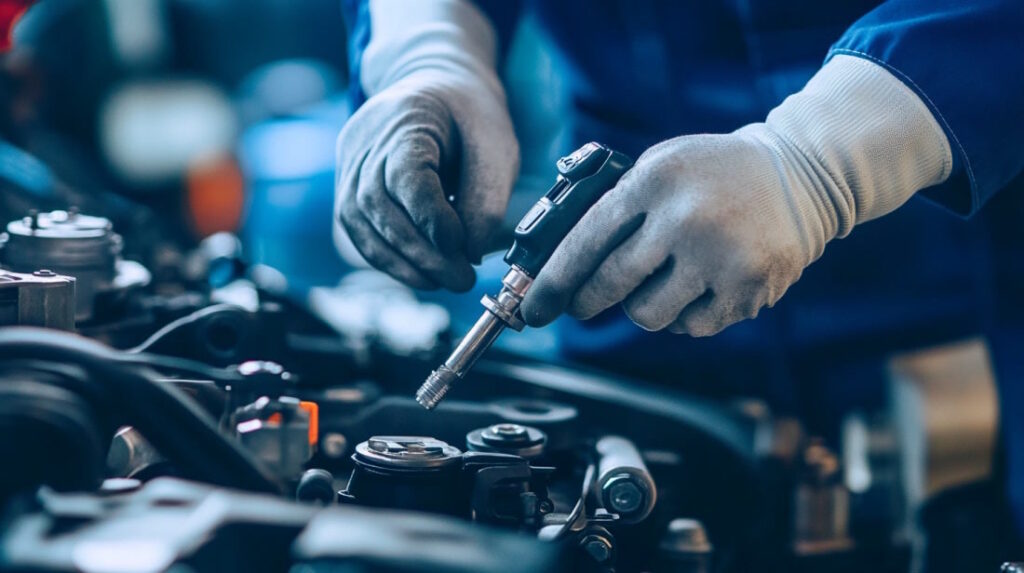Boating is not just a leisure activity; it’s a passion that requires dedication and responsibility. As the seasons change, so do the demands placed on boats. Seasonal boat maintenance is crucial to ensure that vessels remain in optimal condition, providing safety and performance for their owners. Neglecting this maintenance can lead to costly repairs, decreased lifespan of the boat, and even safety hazards on the water.
In recent years, mobile marine services have emerged as a convenient and efficient solution for boat owners. These services provide professional maintenance and repair directly to the boat’s location, whether it’s docked at a marina or stored in a backyard. On-site assistance saves time and effort by avoiding the need to transport the boat to a service center. Experienced professionals perform maintenance tasks.
The article discusses the importance of regular boat maintenance and how mobile marine services can help boat owners keep up with their maintenance. From preparing boats for the sunny adventures of summer to winterizing them against harsh weather, we’ll provide comprehensive insights and practical tips tailored for seasonal boaters and marina operators. Through this exploration, readers will gain a deeper understanding of best practices in boat care and how leveraging mobile services can enhance their boating experience.

The Importance of Seasonal Boat Maintenance
Why Seasonal Maintenance is Crucial
Boats are exposed to varying environmental conditions throughout the year, from the intense sun and saltwater of summer to the freezing temperatures and moisture of winter. Seasonal maintenance is crucial because it ensures that a boat is prepared to handle these changing conditions. Regular maintenance keeps the boat in peak operating condition, prolongs its lifespan, and helps prevent unexpected breakdowns or costly repairs.
During the summer, maintenance focuses on preparing the boat for frequent use, ensuring that all systems are functioning correctly and safely. In winter, the emphasis shifts to protecting the boat from harsh weather conditions, which can cause significant damage if left unchecked.
Consequences of Neglecting Seasonal Maintenance
Neglecting seasonal boat maintenance can lead to a host of problems that not only affect the boat’s performance but can also pose safety risks. Here are some potential consequences:
- Mechanical Failures: Without regular checks, engines, electrical systems, and other mechanical parts are more prone to failure, which can be both dangerous and expensive to repair.
- Hull and Exterior Damage: Saltwater, algae, and other elements can erode the hull and exterior surfaces, leading to structural damage and reducing the boat’s aesthetic appeal.
- Decreased Lifespan: Regular wear and tear can significantly shorten the lifespan of the boat if not addressed promptly through seasonal maintenance.
- Increased Costs: Small issues left unresolved can escalate into major problems requiring extensive repairs, costing significantly more than routine maintenance.
- Safety Hazards: A poorly maintained boat can pose serious safety risks, including engine failures, electrical fires, or even sinking due to hull breaches.
Key Maintenance Tasks for Summer and Winter
Proper seasonal maintenance involves specific tasks tailored to the demands of summer and winter boating. Here are the key tasks for each season:
- Summer Maintenance Tasks:
- Hull Cleaning and Inspection: Removing marine growth and inspecting for damage or wear.
- Engine and Mechanical Systems Check: Ensuring the engine, fuel systems, and propulsion systems are in good working order.
- Electrical Systems Maintenance: Checking batteries, wiring, and connections to prevent electrical failures.
- Safety Gear Inspection: Ensuring life jackets, flares, fire extinguishers, and other safety equipment are up to date and in good condition.
- Navigation Equipment Check: Verifying the functionality of GPS, radios, and other navigation tools.
- Winter Maintenance Tasks:
- Fuel System Stabilization: Adding stabilizers to prevent fuel degradation and draining fuel lines to prevent freezing.
- Engine and Cooling System Preparation: Flushing the cooling system and adding antifreeze to prevent engine damage.
- Exterior Protection: Applying wax and protective covers to shield the boat from moisture, cold, and UV damage.
- Interior Maintenance: Removing perishables and electronics, and ensuring proper ventilation to prevent mold and mildew.
- Storage Preparation: Securing the boat in a safe location, whether it’s in-water storage with the appropriate winterization or on-land with proper supports and covers.
By adhering to these seasonal maintenance routines, boat owners can ensure their vessels remain in optimal condition year-round, ready for both the high demands of summer boating and the challenges of winter storage.

Preparing Your Boat for Summer
As the boating season approaches, ensuring your vessel is ready for the water is essential. Proper preparation not only guarantees a smooth and enjoyable experience but also helps prevent potential issues that could arise during peak usage. Here’s a detailed guide to getting your boat summer-ready.
Essential Summer Maintenance Checklist
To ensure your boat is in top condition for the summer, follow this comprehensive maintenance checklist:
- Hull Cleaning and Inspection
- Cleaning: Start by thoroughly cleaning the hull to remove any algae, barnacles, or other marine growth accumulated during storage. A clean hull improves the boat’s performance and fuel efficiency.
- Inspection: After cleaning, inspect the hull for any signs of damage, such as cracks, blisters, or worn-out areas. Pay special attention to the seams, joints, and any through-hull fittings to ensure they are watertight.
- Polishing: Apply a marine-grade wax to protect the hull from UV damage and keep it looking its best.
2. Engine and Mechanical Systems Check
- Oil Change: Change the engine oil and filter to ensure the engine runs smoothly. This is crucial after a period of inactivity, as old oil can become contaminated.
- Fuel System Inspection: Check for any leaks, and ensure the fuel lines and tanks are in good condition. Replace the fuel filter if necessary.
- Cooling System Maintenance: Flush the cooling system and check for any blockages or leaks. Make sure the water pump is functioning correctly.
- Propeller and Drive Inspection: Inspect the propeller for any damage, and ensure it’s securely attached. Check the drive system, including belts and hoses, for wear and tear.
3. Electrical Systems and Battery Maintenance
- Battery Check: Test the battery’s charge and condition. Clean the terminals and connections to prevent corrosion. Replace the battery if it’s showing signs of weakness.
- Wiring Inspection: Inspect all wiring for frays, corrosion, or loose connections. Ensure that all lights, gauges, and electrical components are functioning properly.
- Charging System: Verify that the alternator and battery charger are working correctly to avoid power issues while on the water.
4. Safety Gear and Navigation Equipment
- Safety Gear: Inspect all safety equipment, including life jackets, flares, fire extinguishers, and first aid kits. Replace any expired items and ensure everything is easily accessible.
- Navigation Equipment: Test your GPS, depth finder, and other navigation tools. Make sure your charts are up to date, and your compass is calibrated correctly.
- Communication Devices: Check that your marine radio is operational, and consider having a backup communication device on board.
Common Issues Faced During Summer Boating
Even with thorough preparation, summer boating can present certain challenges. Some of the most common issues include:
- Overheating Engines: Hot weather can cause engines to overheat, especially if the cooling system isn’t functioning properly.
- Battery Failures: High temperatures and frequent use can drain batteries faster, leading to unexpected power outages.
- Fuel Contamination: Condensation in fuel tanks during warm weather can lead to water contamination, causing engine problems.
- Electrical Failures: Heat and humidity can exacerbate existing electrical issues, leading to failures in critical systems.
By staying vigilant and performing regular checks throughout the summer, you can minimize these risks and enjoy a hassle-free boating season.
Benefits of Using Mobile Services for Summer Prep
Mobile marine services offer several advantages when preparing your boat for summer:
- Convenience: Mobile services come to your boat’s location, whether it’s docked at a marina or stored at home. This eliminates the need to transport your boat to a service center, saving you time and effort.
- Expertise: Professional technicians bring specialized knowledge and tools directly to your boat, ensuring all maintenance tasks are performed to the highest standards.
- Time Efficiency: With mobile services, you can schedule maintenance at your convenience, often getting faster service than you would at a busy marina or service shop.
- Comprehensive Service: Mobile technicians often provide a full range of services, from engine checks to hull inspections, allowing you to address all your maintenance needs in one visit.
- Cost-Effectiveness: While mobile services may seem like a premium option, they often save money in the long run by preventing costly breakdowns and eliminating the need for multiple trips to a service center.
By utilizing mobile marine services, you can ensure your boat is ready for summer quickly and efficiently, giving you more time to enjoy the water without the worry of unexpected issues.
Winterizing Your Boat
As the boating season winds down and colder weather approaches, preparing your boat for winter storage becomes a critical task. Proper winterization protects your boat from the harsh elements and ensures it’s ready for the water when spring arrives. Here’s a comprehensive guide to winterizing your boat.
Essential Winter Maintenance Checklist
To protect your boat during the winter months, follow this essential maintenance checklist:
- Draining and Stabilizing Fuel Systems
- Fuel Stabilization: Add a fuel stabilizer to the tank to prevent the fuel from breaking down and causing damage to the engine. This step is crucial to avoid issues such as clogged fuel lines or gummed-up carburetors.
- Draining Fuel Lines: Run the engine for a few minutes after adding the stabilizer to circulate it through the fuel system. Then, drain the fuel lines and carburetors to prevent fuel from sitting and potentially freezing in the system.
- Fuel Tank Filling: Fill the fuel tank to about 95% capacity to reduce the chance of condensation forming inside the tank, which can lead to water contamination and corrosion.
2. Engine and Cooling System Preparation
- Oil and Filter Change: Change the engine oil and replace the filter to remove any contaminants that could corrode the engine during storage. Running the engine briefly after the oil change helps circulate the clean oil.
- Cooling System Flush: Drain any residual water from the cooling system and flush it with antifreeze to prevent freezing and corrosion. This step is especially important for boats stored in areas with freezing temperatures.
- Spark Plug Care: Remove the spark plugs and spray fogging oil into the cylinders to protect the engine’s internal components from moisture and corrosion. Reinstall the spark plugs afterward.
3. Protecting the Interior and Exterior
- Exterior Cleaning and Waxing: Thoroughly clean the exterior of the boat to remove salt, grime, and other residues. Apply a protective wax coating to the hull to guard against moisture and UV damage.
- Covering the Boat: Use a high-quality, breathable cover to protect your boat from the elements. Ensure the cover is secured tightly to prevent snow or rain from pooling and causing damage.
- Interior Maintenance: Remove any food, beverages, or perishable items from the boat to prevent attracting pests. Open cabinets, drawers, and compartments to allow air circulation, reducing the risk of mold and mildew.
4. Storing Safety and Navigation Equipment
- Safety Gear Storage: Remove all safety gear, such as life jackets, fire extinguishers, and flares, and store them in a dry, climate-controlled environment. This prevents deterioration and ensures the equipment remains in good condition.
- Electronics Removal: Disconnect and remove all electronics, including GPS units, radios, and fish finders, to protect them from cold and moisture. Store them in a safe, dry place.
- Battery Care: Disconnect the boat’s battery and store it in a cool, dry location. Consider placing it on a trickle charger to maintain its charge over the winter.
Common Winter Storage Mistakes
Winterizing your boat requires attention to detail to avoid common mistakes that can lead to costly damage:
- Inadequate Fuel Stabilization: Failing to add a stabilizer or not running it through the system can lead to fuel degradation and engine problems when you start your boat in the spring.
- Improper Engine Protection: Neglecting to drain the cooling system or apply fogging oil can result in internal engine damage due to freezing or corrosion.
- Inadequate Covering: Using a low-quality cover or not securing it properly can lead to moisture accumulation, which can cause mold, mildew, and hull damage.
- Neglecting Ventilation: Sealing the boat too tightly without allowing for proper ventilation can trap moisture inside, leading to mold and mildew growth.
- Forgetting to Remove Electronics: Leaving electronics on board can result in damage from cold temperatures and moisture, potentially rendering them useless.
How Mobile Services Simplify the Winterizing Process
Winterizing a boat can be a time-consuming and labor-intensive process, but mobile marine services can make it much easier and more efficient. Here’s how:
- On-Site Convenience: Mobile services come to your boat, whether it’s at the marina, your home, or another storage location. This saves you the hassle of transporting your boat to a service center.
- Expert Knowledge: Professional technicians have the expertise to perform all the necessary winterization tasks, ensuring nothing is overlooked and that your boat is properly protected.
- Comprehensive Service: Mobile services typically offer a full range of winterization options, including engine preparation, fuel system stabilization, and hull protection, allowing you to handle all tasks in one visit.
- Time Efficiency: With mobile services, you can often schedule winterization at your convenience, avoiding the long wait times that can occur at busy service centers during the off-season.
- Customized Care: Mobile technicians can tailor their services to your boat’s specific needs, providing a personalized approach that ensures your vessel is well-prepared for winter storage.
By utilizing mobile marine services, you can streamline the winterization process, ensuring your boat is properly prepared and protected throughout the off-season, and ready to hit the water as soon as warmer weather returns.
Advantages of Mobile Marine Services
Mobile marine services have revolutionized the way boat owners manage maintenance and repairs. These services offer a range of benefits that can make boat ownership more convenient, efficient, and cost-effective. Below are the key advantages of opting for mobile marine services.
Convenience and Time-Saving Benefits
One of the most significant advantages of mobile marine services is the convenience they offer. These services bring professional technicians directly to your boat, whether it’s docked at a marina, stored at home, or even in the water. This eliminates the need to transport your boat to a service center, which can be a time-consuming and logistically challenging task, especially for larger vessels.
- On-Site Service: Mobile technicians perform all necessary maintenance and repairs on-site, allowing you to continue with your daily routine without interruption.
- Flexible Scheduling: Mobile services often offer more flexible scheduling options than traditional service centers, accommodating your timetable and reducing downtime.
- Reduced Hassle: Without the need to haul your boat to a service location, you save significant time and effort, making the process of maintaining your boat much simpler.
Expertise and Specialized Equipment
Mobile marine service providers are typically staffed by experienced professionals with specialized knowledge and equipment tailored for on-site boat maintenance and repairs. This ensures that your boat receives the highest quality care, even outside of a traditional service center.
- Trained Technicians: Mobile service technicians are often highly skilled and knowledgeable about a wide range of boat types and maintenance needs. They can quickly diagnose and address issues on-site.
- Advanced Tools: These services come equipped with all the necessary tools and diagnostic equipment to perform comprehensive maintenance and repairs, from engine tuning to hull inspections.
- Expert Advice: Mobile technicians can offer personalized advice and recommendations based on the specific condition and needs of your boat, helping you prevent future issues and optimize performance.
Flexibility and Customization
Mobile marine services offer a high degree of flexibility and customization, allowing boat owners to tailor services to their specific needs. Whether you require routine maintenance, emergency repairs, or seasonal preparation, mobile services can accommodate a wide range of requests.
- Custom Service Plans: Mobile providers can work with you to create a customized maintenance plan that fits your boat’s unique requirements and your schedule, ensuring that all necessary tasks are addressed efficiently.
- Variety of Services: From simple oil changes to complex engine repairs and electrical system diagnostics, mobile services can handle almost any maintenance task, often with the added benefit of adapting to your boat’s particular setup.
- Personalized Attention: Unlike at busy service centers where boats may be treated in a more standardized way, mobile services offer a more personalized approach, focusing exclusively on your boat during the service visit.
Cost-Effectiveness Compared to Traditional Services
While it might seem that mobile services would come at a premium, they can actually be more cost-effective than traditional services when you consider the overall savings in time, effort, and potential for preventative care.
- Reduced Transportation Costs: By eliminating the need to transport your boat to and from a service center, you save on fuel, transportation fees, and the wear and tear associated with moving your boat.
- Preventative Maintenance: Mobile services can help identify and address issues early, preventing them from developing into more significant, costly repairs down the line.
- Transparent Pricing: Many mobile services offer straightforward pricing models, often charging only for the services performed without hidden fees or additional costs that can sometimes be associated with traditional service centers.
- Efficiency Gains: Since mobile services are performed on-site, there’s often less downtime between tasks, making the service more efficient and potentially reducing labor costs.
Case Studies: Success Stories from Seasonal Boaters
Real-life examples of how mobile marine services have benefited boat owners highlight the practical advantages of these services. Here, we present two success stories that demonstrate how mobile services can make seasonal boat maintenance more efficient and effective.

Example 1: Smooth Summer Preparation
Boater Profile:
David, a seasoned boater with a 28-foot cabin cruiser, spends his summers exploring coastal waters with his family. However, with a busy work schedule, he found it challenging to find time to get his boat ready for summer.
Challenge:
David needed to ensure his boat was fully prepared for the summer, including a thorough hull cleaning, engine tune-up, and safety gear inspection. In previous years, he had experienced delays and missed out on prime boating days due to the time it took to transport his boat to a service center and wait for the work to be completed.
Solution:
David decided to try a local mobile marine service recommended by a fellow boater. The service scheduled a convenient time to visit his marina, and within a few hours, the technicians had completed all the necessary summer prep tasks. They cleaned the hull, performed an engine check, replaced the fuel filter, inspected the electrical systems, and ensured all safety equipment was up-to-date.
Outcome:
Thanks to the mobile service, David’s boat was ready for the water well ahead of schedule. He was able to enjoy the full summer season without any mechanical issues, and he appreciated the time saved by avoiding trips to the service center. The experience was so positive that he now uses the same service every year for his summer preparation.

Example 2: Hassle-Free Winterizing
Boater Profile:
Sarah, the owner of a 35-foot sailboat, has been sailing for over a decade. She stores her boat on land during the winter months to protect it from harsh weather conditions.
Challenge:
Winterizing the sailboat was always a daunting task for Sarah. In the past, she had to coordinate with a service center, often resulting in delays and additional costs due to the boat’s size and the complex nature of the work required. Additionally, Sarah was concerned about ensuring the boat was adequately protected against freezing temperatures.
Solution:
After hearing about mobile marine services from a boating forum, Sarah decided to give it a try. She contacted a mobile service provider, and they arranged a visit to her storage location. The technicians handled the entire winterization process on-site, including draining and stabilizing the fuel system, flushing the cooling system with antifreeze, protecting the hull with a wax coat, and covering the boat securely for storage.
Outcome:
The process was seamless and efficient. Sarah’s sailboat was winterized in a single visit, without the need for transportation or waiting for service center availability. The mobile service even provided follow-up support, checking in mid-winter to ensure everything remained in good condition. Sarah was impressed with the quality of the service and the peace of mind it provided, knowing her boat was well-protected throughout the winter.
Lessons Learned and Best Practices
These case studies highlight several key takeaways and best practices for boat owners considering mobile marine services:
- Time Efficiency: Mobile marine services can significantly reduce the time needed for seasonal preparation and winterization, allowing boaters to maximize their time on the water during peak seasons.
- Convenience: Having services performed on-site at your boat’s location eliminates the logistical challenges of transporting your vessel, making the process smoother and less stressful.
- Preventative Care: Mobile services often provide thorough inspections as part of their routine maintenance, helping to identify potential issues early and preventing costly repairs in the future.
- Customization: The ability to tailor services to the specific needs of your boat ensures that all necessary tasks are addressed effectively, providing personalized care that can enhance your boat’s performance and longevity.
- Reliable Expertise: Working with experienced mobile technicians ensures that your boat is maintained to high standards, offering the same level of professionalism you would expect from a traditional service center.
Conclusion
Maintaining your boat seasonally is not just a matter of keeping it in good working order; it’s about ensuring safety, preserving your investment, and maximizing your enjoyment on the water. As we’ve explored, both summer preparation and winterizing are critical to your boat’s performance and longevity. The benefits of using mobile marine services, as demonstrated in the success stories, highlight how these services can simplify the process, saving you time, reducing stress, and ensuring that every detail is handled by experts.
Mobile marine services bring convenience, expertise, and flexibility directly to your boat’s location, making it easier than ever to stay ahead of your maintenance schedule. Whether you’re preparing for a busy summer on the water or protecting your vessel from harsh winter conditions, mobile services provide a practical, cost-effective solution.
If you’re ready to take the hassle out of your boat maintenance and experience the convenience of professional, on-site service, check out NTD Marine Group’s Mobile Marine Service. Our team of experienced technicians is equipped to handle all your seasonal maintenance needs, ensuring your boat is in top condition year-round. Don’t wait until it’s too late—schedule your service today and enjoy peace of mind knowing your boat is in expert hands.





